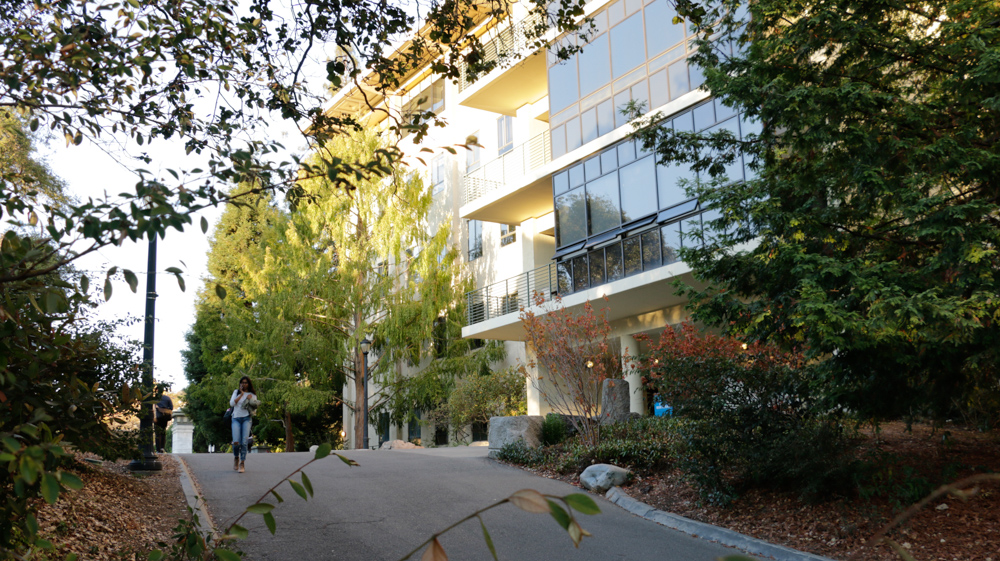Earth Sciences & Map Library
The Earth Sciences & Map Library welcomes all community members to explore our extensive resources, including one of the largest map collections in California. You’ll also find materials covering earth sciences, physical geography, atmospheric science, cartography, and geospatial science, and a variety of study and collaborative spaces.
This library is wheelchair accessible.
Hours
| Location | Sun | Mon | Tue | Wed | Thu | Fri | Sat |
|---|---|---|---|---|---|---|---|
| Earth Sciences & Map Library monthly calendar | Closed |
Closed Academic Holiday |
11 a.m.-5 p.m. | 11 a.m.-5 p.m. | 11 a.m.-5 p.m. | 11 a.m.-5 p.m. | Closed |
Collections
At this library
Resources
Services
-
epslibs@berkeley.edu
Use online tools or connect with a librarian to achieve your research goals.
-
The UC Berkeley Library provides special assistance to Library users with disabilities as they engage with the Library and its resources.
- Circulation Desk510-642-2997
eart-library@berkeley.eduCheck out and return books, pick up paged materials, or get help searching for an item.
-
Make use of the printing and scanning options available at most library locations.
-
Request journal articles and conference papers that you need in a hurry.
-
Learn how to access or place textbooks and other materials on digital course reserves.
-
510-642-9255 (642-WALK)
Arrange free night-safety services, including a walking escort to get you home safely.
Contact
-

-

-
 Susan Powell
Susan Powell
GIS & Map Librarian
510-643-2684smpowell@berkeley.edu
Book appointment with Susan Powell -
 Karen Pfeffer
Karen Pfeffer
Circulation Supervisor & Technical Processing Assistant
510-643-7041karen.pfeffer@berkeley.edu
Location

50 McCone Hall
University of California
Berkeley, CA 94720-6000
This library is wheelchair accessible.
Explore the Earth Sciences & Map Library
Visit
Welcome to the Earth Sciences & Map Library.
Physical access to this library is open to all researchers and visitors without requirement of any identification, registration, pass, or prior arrangements. Certain services, collections, equipment, or rooms within this library may be available only to certain groups of UC Berkeley students, faculty, and staff.
Please inquire at the Circulation Desk for further details.
Borrow
The UC Berkeley Library’s collections are rich and bountiful — and they’re waiting to be explored by members of the UC Berkeley community and knowledge-seekers everywhere. Use UC Library Search, the University of California’s all-in-one-platform for discovery, to find books, journals, articles, and more, and check them out at libraries across the Berkeley campus and at other UC schools. Learn more about borrowing Library materials.
Scanning services
The Earth Sciences & Map Library offers self-service printing, scanning, and copying options up to 11x17 for library materials via a BookScan station and printer. Cal 1 Cards, Cal 1 Guest Cards, or Cal 1 Department Cards are required for these services. Please see the central library Print + scan page for more information.
Large format scanning
The Earth Sciences & Map Library also offers large format scanning services for cartographic materials. Our sheet-feed scanner is capable of scanning maps with a maximum dimension of 52 inches. We are not able to scan bound items. For oversize or bound materials, please contact Duplication Services. Maps are scanned at 400dpi (600dpi available upon request) and delivered via the web as high quality JPEG or TIFF files. Please see this library guide regarding large format scanning for more information.
About the collection
The collection covers physical geography and the geosciences including structural geology, tectonics, oceanography, seismology, geochemistry, glaciology, geophysics, atmospheric science, planetary science, geomorphology, climatology, and cartography. It includes thousands of volumes and e-books, print and electronic journals, and hundreds of thousands of maps and air photos issued by local, state, and federal agencies, foreign governments, international organizations, and commercial firms.
Instruction
Sciences librarians offer a wide variety of tailored instruction sessions for students, faculty, and staff.
Workshops include topics such as:
- writing and citing tools such as Overleaf and Zotero.
- identifying and using geographic information system (GIS) and mapping tools.
- finding, reusing, organizing, and describing data.
- data analysis and visualization tools.
- planning literature reviews.
- writing and publishing scientific papers.
Course-integrated instruction: Faculty and instructors can also request course-integrated instruction in support of an assignment or project. A librarian can meet with students during a class or discussion section, in person or on Zoom, to teach one or more sessions on searching, evaluating, saving, and organizing science information sources, as well as other topics.
For more information about our workshops and instruction sessions, please visit the Events & Instruction from the Sciences Libraries guide or contact us.